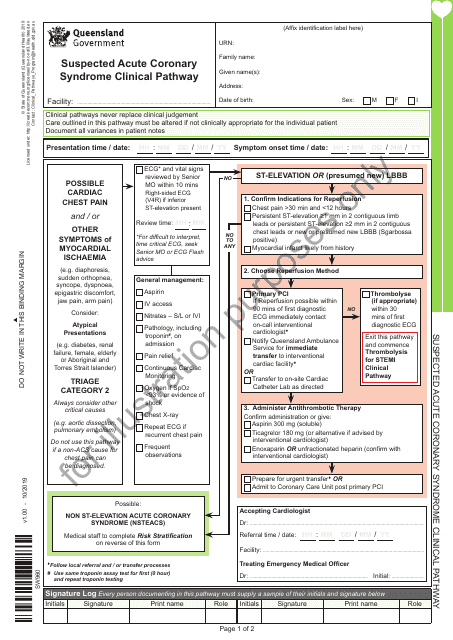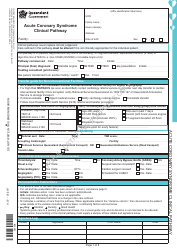Suspected Acute Coronary Syndrome Clinical Pathway - Queensland, Australia
The Suspected Acute Coronary Syndrome Clinical Pathway in Queensland, Australia, is a medical guideline used to manage and treat patients who are suspected of experiencing acute coronary syndrome. Acute coronary syndrome is a term used for any condition brought on by sudden, reduced blood flow to the heart, including a heart attack. This pathway outlines the best practices for healthcare providers in diagnosing, assessing, and managing patients at various stages of this condition. It's designed to streamline patient care, improve medical outcomes, reduce complications, and boost overall efficiency within the healthcare system, thereby ensuring that patients receive timely and appropriate care.
The Suspected Acute Coronary Syndrome Clinical Pathway is typically filed by healthcare providers, specifically doctors and nurses, in the Queensland Health system in Australia. This could include providers in hospitals, emergency departments, or other healthcare settings across Queensland who are treating a patient suspected of having Acute Coronary Syndrome. This document outlines best practice care and treatment for patients presenting with chest pain and suspected of Acute Coronary Syndrome, ensuring they receive consistent, high-quality care.
FAQ
Q: What is the suspected acute coronary syndrome clinical pathway in Queensland, Australia?
A: The suspected Acute Coronary Syndrome (ACS) clinical pathway in Queensland, Australia is a structured plan used by medical professionals to handle patients suspected of having ACS. The pathway outlines critical steps for accurate diagnosis, immediate and long-term treatment plans, as well as guidelines for patient education and follow-up care.
Q: What is acute coronary syndrome (ACS)?
A: Acute Coronary Syndrome (ACS) refers to a range of conditions associated with sudden, reduced blood flow to the heart. It comprises heart conditions such as heart attack (myocardial infarction) and unstable angina. Symptoms can include chest pain, sweating, shortness of breath, nausea, and fatigue. It's a medical emergency requiring immediate attention.
Q: What does the clinical pathway for suspected ACS entail?
A: Although specifics can vary by healthcare institution, the clinical pathway typically includes initial assessment and stabilization, diagnostic testing (like blood tests and EKGs), risk stratification, deciding on the appropriate setting for care (like hospital admission or management as an outpatient), initiating therapies (like medications or procedures), and planning for long-term care and prevention strategies.
Q: How is suspected ACS treated in Queensland, Australia?
A: In Queensland, Australia, suspected ACS is treated according to the latest clinical guidelines. This usually includes immediate measures like aspirin and nitroglycerin, diagnostic tests, potential hospital admission, and depending on the severity, possibly medications or interventions like angioplasty or bypass surgery. Long-term management often involves lifestyle changes and medications to prevent further heart problems.
Q: What is the purpose of a clinical pathway?
A: A clinical pathway, also known as a care pathway, is a multidisciplinary management tool used in healthcare to map out the ideal sequence of care processes for a specific clinical condition. The goal is to standardize care, decrease variability in treatment, improve patient outcomes, and minimize costs.
Q: How effective are clinical pathways like the one for suspected ACS in Queensland, Australia?
A: Clinical pathways like the one for ACS in Queensland, Australia can be highly effective. By standardizing care, they help ensure that patients receive evidence-based best practices consistently. This can help reduce complications, improve patient outcomes, and contain healthcare costs.





